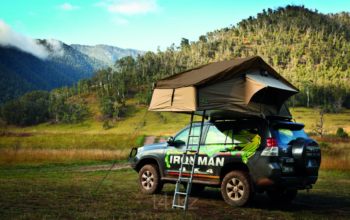Welcome to the ultimate guide on choosing tandem axle trailers! Whether you are a first-time buyer or an experienced trailer owner looking for an upgrade, this comprehensive blog post will help you understand all the important factors to consider when selecting a tandem axle trailer that meets your specific needs.
Understanding Tandem Axle Trailers:
What are tandem axle trailers?
Tandem axle trailers are trailers that have two axles, each with two wheels. These trailers are commonly used for various purposes, from residential to commercial and recreational applications. The basic features of tandem axle trailers include the presence of two axles, which provide additional stability and weight-bearing capacity compared to single axle trailers. The benefits of using tandem axles include improved weight distribution, increased load capacity, and enhanced towing stability.
Common Uses of Tandem Axle Trailers:
Residential purposes:
Tandem axle trailers are widely used for residential purposes, such as moving household items or hauling appliances. The increased weight capacity and stability of these trailers make them ideal for transporting heavy loads.
Commercial applications:
In commercial settings, tandem axle trailers are commonly used in industries like construction and landscaping. These trailers can handle large equipment, tools, and materials, making them essential for transporting heavy machinery or bulk materials.
Recreation:
Tandem axle trailers are also popular for recreational use, particularly for towing boats, ATVs, motorcycles, or other recreational vehicles. The added stability and weight-bearing capacity ensure a smooth and safe towing experience.
Determining Your Trailer Requirements:
Weight Capacity and Payload:
Calculating the total weight capacity needed:
To determine the appropriate weight capacity for your tandem axle trailer, you need to consider the combined weight of the trailer itself and the maximum payload it can carry. This calculation involves estimating the weight of the cargo you intend to transport. It is crucial to choose a trailer with a weight capacity that exceeds your payload requirements to ensure safe and efficient hauling.
Understanding payload requirements based on intended use:
The payload requirements for tandem axle trailers vary depending on the intended use. For residential purposes, you may need a trailer with a higher payload capacity to accommodate large appliances or furniture. In commercial applications, the payload requirements may differ based on the type of equipment or materials being transported. It is essential to assess your specific needs and choose a tandem axle trailer that can handle the intended payload.
Trailer Size and Dimensions:
Assessing the right length, width, and height for your needs:
When selecting a tandem axle trailer, it is crucial to consider the appropriate size and dimensions. The length, width, and height of the trailer should align with your specific requirements. For example, if you plan to transport long items like lumber or building materials, a longer trailer may be necessary. Additionally, considering the maximum height and width restrictions in your area is essential to avoid any transportation issues.
Considering any size restrictions or limitations:
Before purchasing a tandem axle trailer, it is essential to consider any size restrictions or limitations that may impact your ability to tow or transport the trailer. These restrictions can vary from state to state, so it is crucial to familiarize yourself with local regulations to ensure compliance.

Types of Tandem Axle Trailers:
Enclosed vs Open Trailers:
Pros and cons of each type:
Enclosed tandem axle trailers provide protection and security for your cargo, making them suitable for transporting valuable or sensitive items. They offer weatherproofing and lockable doors, ensuring that your belongings are safe from external elements and theft. Open tandem axle trailers, on the other hand, offer easy accessibility and versatility for loading and unloading. They are often less expensive than enclosed trailers and are suitable for hauling larger, bulkier items.
Choosing between the two based on your specific needs:
When deciding between enclosed and open tandem axle trailers, it is essential to consider your specific needs. If you frequently transport valuable items or need added protection from the elements, an enclosed trailer may be the better choice. However, if you require easy access to your cargo and prioritize affordability, an open trailer may be more suitable.
Deck Material Options:
Comparing various deck materials (wood, steel, aluminum):
Tandem axle trailers can come with different deck materials, each offering unique characteristics. Wood decks are commonly used and provide excellent traction, but they require regular maintenance to prevent rotting or warping. Steel decks offer durability and strength, making them ideal for heavy-duty applications, but they can be susceptible to rust. Aluminum decks are lightweight, corrosion-resistant, and low-maintenance, making them suitable for recreational use.
Selecting the most suitable material for durability and longevity:
To select the most suitable deck material for your tandem axle trailer, consider factors such as durability, maintenance requirements, and intended use. If you prioritize durability and are willing to perform regular maintenance, a wood or steel deck may be suitable. However, if you prefer a low-maintenance option with excellent corrosion resistance, an aluminum deck may be the better choice.
Important Features to Consider:
Suspension System:
Leaf spring vs torsion suspension systems:
Leaf spring suspension systems consist of stacked metal strips that provide support and absorb shocks. They are commonly used and offer reliable performance, making them suitable for various applications. Torsion suspension systems, on the other hand, use rubber cords or bars to provide suspension. They offer a smoother ride and better load distribution, making them ideal for transporting delicate or fragile cargo.
Which suspension system is best suited for your trailer usage?
The choice between leaf spring and torsion suspension systems depends on your trailer usage. If you prioritize durability and versatility, leaf spring suspension systems are a popular choice. However, if you transport delicate or fragile cargo that requires a smoother ride, torsion suspension systems may be more suitable.
Brake Systems options:
Electric brakes vs hydraulic surge brakes:
Electric brake systems use an electrical connection between the towing vehicle and trailer to activate the brakes. They provide precise braking control and are suitable for various towing situations. Hydraulic surge brake systems, on the other hand, rely on the trailer’s movement to activate the brakes. They are commonly used for boat trailers and provide a smooth, proportional braking experience.
Understanding the benefits and choosing the right brake system:
When choosing between electric and hydraulic surge brake systems, consider factors such as towing vehicle compatibility, braking performance requirements, and personal preferences. Electric brakes offer precise control but require a compatible towing vehicle with an electrical connection. Hydraulic surge brakes provide a smooth braking experience but may not be suitable for all towing situations.
Hitch Types:
Ball hitch vs gooseneck hitch:
Ball hitches are the most common type of hitch and are suitable for smaller trailers. They consist of a ball mount on the towing vehicle and a coupler on the trailer. Gooseneck hitches, on the other hand, are suitable for larger trailers and provide increased stability and weight distribution. They involve a hitch that connects to the towing vehicle’s bed instead of the rear bumper.
Determining the ideal hitch type based on your towing vehicle and trailer size:
The ideal hitch type depends on your towing vehicle and trailer size. Ball hitches are suitable for smaller trailers and are compatible with a wide range of towing vehicles. Gooseneck hitches offer increased stability and weight distribution, making them suitable for larger trailers and heavy loads. It is essential to ensure your towing vehicle has the necessary towing capacity and compatibility for the chosen hitch type.
Budget Considerations:
Establishing a Realistic Budget:
Factors influencing trailer prices:
Trailer prices can vary based on factors such as size, weight capacity, deck material, suspension system, brake system, and additional features. Establishing a realistic budget involves considering your specific needs and prioritizing essential features without overspending.
Tips for finding an affordable tandem axle trailer without compromising quality:
To find an affordable tandem axle trailer without compromising quality, consider comparing prices from different manufacturers or dealers. Look for sales or promotions, and consider purchasing a used trailer if it meets your requirements. It is crucial to prioritize quality and durability when making budget considerations.
Financing Options:
Exploring financing possibilities if needed:
If you require financing for your tandem axle trailer purchase, explore various financing options available. These may include bank loans, dealer financing, or leasing options. Assess your financial situation and choose a financing option that offers favorable terms and interest rates.
Researching reputable lenders and loan terms:
When researching financing options, it is essential to research reputable lenders and loan terms. Compare interest rates, loan durations, and repayment terms to find the best financing solution that suits your financial situation.
Conclusion:
By following this ultimate guide, you are now equipped with the knowledge to make an informed decision when it comes to choosing tandem axle trailers. Remember to carefully assess your specific needs, consider important features, and stick to your budget while selecting a trailer that will serve you well for years to come. Happy hauling!



